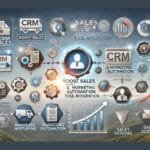
How to Boost Sales with CRM and Marketing Automation Tool Integration
September 30, 2024
Choosing the Best Marketing Automation Tool for eCommerce
September 30, 2024How to Boost eCommerce Sales with Marketing Automation Tools
In today’s competitive digital landscape, boosting eCommerce sales requires more than just a beautiful website and great products. To stay ahead, businesses need to leverage marketing automation tools that streamline processes, improve customer interactions, and optimize sales funnels. With marketing automation, your team can handle repetitive tasks more efficiently, allowing you to focus on scaling your business.
Table of Contents
What is Marketing Automation and Why Does it Matter?
Before diving into strategies, it’s essential to understand marketing automation and its impact on eCommerce.
What is Marketing Automation?
Marketing automation refers to software platforms designed to automate repetitive tasks across multiple marketing channels. These tasks include email campaigns, social media posting, and customer segmentation. The goal is to improve efficiency, reduce manual labor, and provide a more personalized customer experience.
Why is Marketing Automation Crucial for eCommerce?
- Saves Time and Resources: Automating repetitive tasks allows teams to focus on more strategic activities.
- Enhances Customer Experience: Automation personalizes marketing efforts, creating a better experience for potential buyers.
- Boosts Conversion Rates: With streamlined workflows, you can target customers with tailored messages at the right time.
Essential Marketing Automation Tools for eCommerce
Let’s explore the must-have tools that can transform your eCommerce sales strategy.
1. Email Automation Platforms
Email marketing is a powerful channel for eCommerce, and automating this process can significantly increase conversion rates. Tools like Mailchimp, Klaviyo, and ActiveCampaign allow businesses to send targeted, automated emails based on customer behavior.
Key Benefits:
- Abandoned Cart Recovery: Automatically remind customers about items left in their carts.
- Customer Segmentation: Send personalized offers to different customer groups.
- Behavioral Triggers: Automate follow-ups based on website interactions, such as browsing certain products.
2. Customer Relationship Management (CRM) Systems
A CRM system is the backbone of any automated marketing strategy. It stores valuable customer data, tracks interactions, and ensures your marketing efforts are aligned with sales goals. HubSpot and Salesforce are leading CRM platforms integrated with powerful automation capabilities.
Key Benefits:
- Personalized Campaigns: CRM-driven marketing allows personalized messages based on previous purchases and interactions.
- Lead Nurturing: Automate lead follow-ups, ensuring potential customers receive timely communications.
3. Social Media Automation Tools
Automating your social media can be a game-changer. Platforms like Hootsuite, Buffer, and Later allow businesses to schedule posts, track performance, and engage with followers automatically.
Key Benefits:
- Scheduled Posting: Maintain a consistent social media presence without manual input.
- Audience Insights: Track engagement and optimize content strategies.
How to Use Automation to Boost Sales Funnels
Now that you’re familiar with the essential tools, let’s see how you can optimize your sales funnel with automation.
1. Lead Generation with Landing Pages
Automated tools like Unbounce or Instapage allow you to create and optimize landing pages without coding. You can set up lead forms that automatically integrate with your CRM and email systems.
Strategy in Action:
- A/B Testing: Run multiple versions of a landing page and let the tool pick the most successful one.
- Lead Scoring: Automatically assign scores to leads based on actions, prioritizing those more likely to convert.
2. Automating Personalized Product Recommendations
When customers visit your website, they expect tailored recommendations. Tools like Nosto and Monetate use data from browsing history, previous purchases, and behavior to automate personalized product suggestions.
Strategy in Action:
- Dynamic Content: Show personalized product suggestions and special offers to returning visitors.
- Cross-Selling: Automate cross-sell and upsell suggestions to increase the average order value.
Optimizing Customer Retention with Marketing Automation
Retaining customers is often more cost-effective than acquiring new ones. Here’s how marketing automation can help with retention.
1. Automated Loyalty Programs
Platforms like LoyaltyLion and Smile.io enable businesses to automate customer loyalty programs. Automatically track customer points and send out rewards, helping to build long-term relationships.
Key Benefits:
- Automated Notifications: Customers are automatically informed when they earn points or rewards.
- Customizable Rules: Set triggers based on customer behavior, such as extra points for leaving reviews or making multiple purchases.
2. Re-engagement Campaigns
When customers haven’t visited your site in a while, automated re-engagement campaigns can bring them back. Using email automation, you can send personalized offers, discounts, or reminders about loyalty points.
Strategy in Action:
- Win-Back Emails: Use segmentation and behavioral triggers to send emails designed to re-engage inactive customers.
Measuring and Optimizing the Impact of Automation
To ensure your automation strategies are working, constant analysis and optimization are necessary.
1. Tracking KPIs with Automation Tools
Tools like Google Analytics, Kissmetrics, and Mixpanel allow you to automate the tracking of key performance indicators (KPIs). These tools can provide insights into how automation efforts impact conversions, retention, and customer satisfaction.
KPIs to Monitor:
- Conversion Rates: Measure how effectively your automated campaigns turn leads into customers.
- Customer Lifetime Value (CLV): Understand the long-term value of your customers to see how well your retention automation is working.
2. Optimizing Campaigns Based on Data
Automated tools like Optimizely allow A/B testing and personalization of campaigns. Use data to constantly refine and optimize your automated efforts for better results.
How to Boost eCommerce Sales with Marketing Automation Tools Comparaison
Frequently Asked Questions (FAQs)
1. What are the best marketing automation tools for eCommerce?
The best tools depend on your business needs. However, some highly recommended ones include Mailchimp for email automation, HubSpot for CRM, and Hootsuite for social media automation.
2. How does marketing automation improve customer retention?
Automation helps businesses personalize their marketing efforts, sending timely emails, loyalty rewards, and re-engagement offers that encourage repeat purchases and long-term customer relationships.
3. Can small eCommerce businesses benefit from marketing automation?
Absolutely! Automation tools scale to fit businesses of all sizes. For small businesses, automation saves time and ensures they can deliver personalized customer experiences without a large team.
Conclusion: Elevate Your eCommerce Sales with Automation
Implementing marketing automation tools is no longer a luxury—it’s a necessity for scaling eCommerce businesses. These tools not only help increase efficiency but also enhance customer experiences, improve lead conversion, and boost retention rates. By automating your eCommerce processes, you’ll stay ahead of competitors and ensure long-term success.








